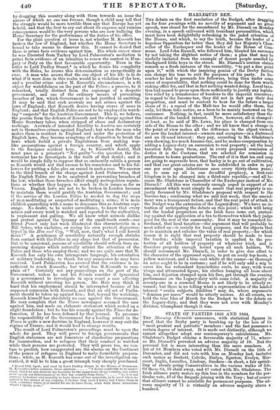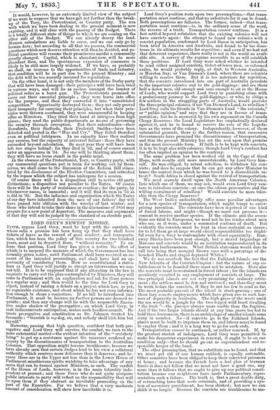STATE OF PARTIES 1853 AND 1854.
THE Morning Chronicle announces, with statistical figures in proof, that the Derby party is breaking up by the loss of its " most prudent and patriotic" members : and the fact possesses a certain degree of interest. It is made out distinctly, although we cannot altogether adopt our contemporary's calculations. Mr. Gladstone's Budget obtains a favourable majority of 71, where- as Mr. Disraeli's provoked an adverse majority of 19. But the personal list is more interesting than the mere numbers. A list of 64 Members who voted with Mr. Disraeli on the 16th of December, and did not vote with him on Monday last, includes such names as Beckett, Colvile, Emlyn, Egerton, Evelyn, Har- court, Inglis, Lascelles, Lindsay, Sandars—in short, a fair sprink- ling of steady-going Conservatives in the various walks of life. Of these 64, 16 staid away, and 47 voted with Mr. Gladstone. The Irish alliance party makes up this loss in the numbers for the par- ticular vote, 49 of the Brigade joining with the Tory ; but of course that affiance cannot be available for permanent purposes. The ad- verse majority of 71 is virtually an adverse majority above a hundred. It would, however, be an extremely limited view of the subject if we were to suppose that we have got not further than the break- up of the Tory, the Protectionist, or Country party. The EC ra with which we have been dealing to the present moment is now expiring, and it will close with the passing of the Budget. There is a totally different state of things to which we are coming on the other side of the Budget. We can already descry the land. Human calculations are liable to error, and we can only go by human data; but according to all that we possess, the commercial questions which now deserve attention will then be decided, and r_ laical questions will resume their prominence amidst a community greatly changed. Capital, which is abundant now, will be more abundant then, and the spontaneous expansion of commerce is likely to be still more largely widened. If we have, as probably we shall, an increase to the opportunities of trade and industry, that condition will be in part due to the present Ministry ; and the debt will be too recently incurred for repudiation. On the other hand, it is not only the members of the Derby party that will have been damaged : their principles will have been tried in various ways, and will lie as useless amongst the lumber of political relics as a burst gun. The Protectionists promised to carry out their essential principle ; they were borne into office for the purpose, and then they converted it into " unrestricted competition. Opportunity destroyed them; they not only proved their incapacity for carrying their principles, but when their prin- ciples were thrown overboard, they were unsuccessful in keeping office as Ministers. They tried their hand at intrigues from high places ; they used the public departments as means of governing the country through corruption. But their subordinates—their Beresfords, their Staffords, their Frederick Smiths—have been detected and posted in the "Hue and Cry." They failed therefore even as political intriguers. In no capacity have they realized any success, but the capacity of universal failure : there they have succeeded beyond calculation. By next year they will have been left two stages behind: for they died in '52, and of course cannot enter an appearance in '54. No one will be thinking about them ; they will have no locus standi in the public mind.
In the absence of the Protectionist, v or Country party, with our commercial questions put in train for working out by them- selves, we shall come to the discussion of the Reform Bill stimu- lated by the disclosures of the Election Committees, and refreshed by the repose which the subject has undergone for a session. Of course there will be a disposition still to revive old party distinctions • a disposition not peculiar to the Tories. Of course there will be the party of resistance or reaction ; for the party, by whatsoever name, is immortal; and it will find its men in '54 as is did in '32. But the influence and organization which the Tories of our day have inherited from the men of our fathers' day will have passed into oblivion with the wrecks of last winter; and those who intend to take their share in the discussions of 1854 may prepare for a new point of departure. The measures and arguments of that day will not be judged by the standard of an obsolete past.



























 Previous page
Previous page